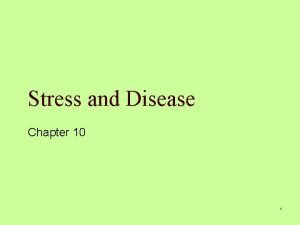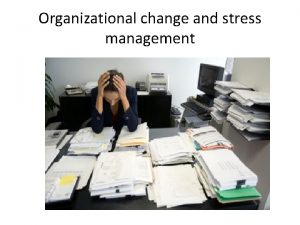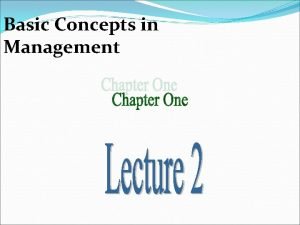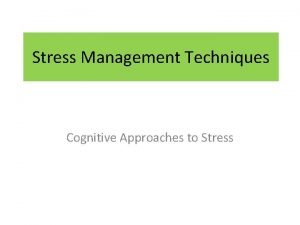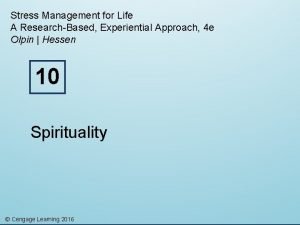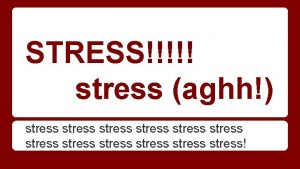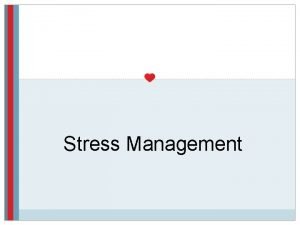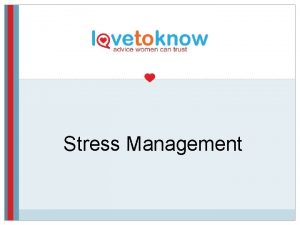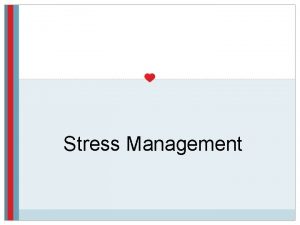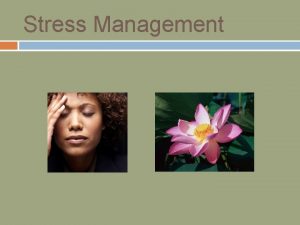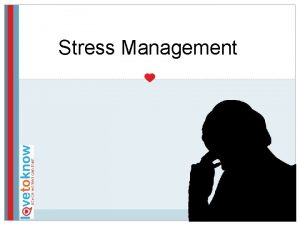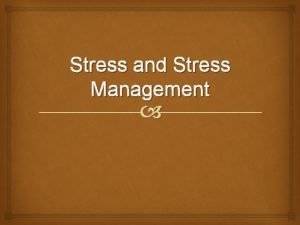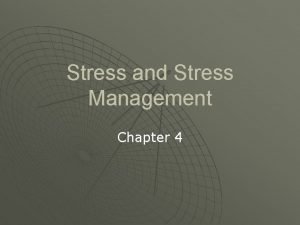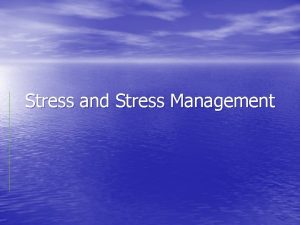Stress and Stress Management What is Stress n
















- Slides: 16

Stress and Stress Management

What is Stress n The common expression for stress is ‘tension’ One is said to be tense, when there is some anxiety, some fear of whether the desirable things may happen, whether something may go wrong, etc. It is a state of discomfort felt in the mind and experienced by the body.

Stress is physical n When the goalkeeper or the batsman or the tennis player experiences Eustress, there are changes in the physical system. The muscles become tense. The eyes become sharper. When one is under severe distress, the person sweats, the body becomes weak and loses strength

Stress is psychological n Stress is experienced when one perceives a threat and the fight or flight response is called for.

Stressors Needs not met. These could be needs for power, for fulfillment, for use of n n n n n knowledge Not being included by others as part of a group you want to belong to Not being recognized or valued for one’s competence Feeling that one is not adequate for the task, particularly when compared to some one else Being denied what is due (rewards, work) Monotony or boredom Not having enough freedom at work, being closely supervised Inequity in rewards, assignments Very little opportunity for growth Too much of work, overload Too little work, boredom Inadequate resources to do the assigned work, creating possibilities of failures Conflict in values at work, being required to do what one does not like to do Too many and conflicting demands at work from the role set Responsibilities not clear, ambiguity on what is expected Ununderstanding, unpredictable, temperamental boss New unfamiliar

Levels of Stress n n The first is the normal initial response and is characterised by increased heart beat rates, increased blood pressure, dilation of pupils, sweat in palms and reduced activity in the stomach. At the second level, there is more irritability, stuttering and stammering, difficulty in concentrating, restlessness, lack of appetite and tendency to increased smoking or drinking for those so habituated.

At the third level, there would be more headaches, stomach aches, diarrhoea, sweating, insomnia, depression etc. n The fourth level would be characterized by ulcers, stroke, alcoholism, drug addiction, psychosis etc. n

Managing Stress n n n One is that one should not develop stress to the point that one becomes non-functional The second is to try to get back to normal as quickly as one can and not continue to be in a state of stress for too long. The third is to recognize that worry and anxiety will not modify the situation, but will only disturb one’s peace of mind and health

As the Manager n Recognise the stress levels n Show concern n Encourage talking n Listen n Provide support n Explain and show it can be done

1. Become aware of your stressors and your emotional and physical reactions. n Notice your distress. Don't ignore it. Don't gloss over your problems. n Determine what events distress you. What are you telling yourself about meaning of these events? n Determine how your body responds to the stress. Do you become nervous or physically upset? If so, in what specific ways?

2. Recognize what you can change. n Can you change your stressors by avoiding or eliminating them completely? n Can you reduce their intensity (manage them over a period of time instead of on a daily or weekly basis)? n Can you shorten your exposure to stress (take a break, leave the physical premises)? Can you devote the time and energy necessary to making a change (goal setting, time management techniques, and delayed gratification strategies may be helpful here)?

3. Reduce the intensity of your emotional reactions to stress. n The stress reaction is triggered by your perception of danger. . . physical danger and/or emotional danger. Are you viewing your stressors in exaggerated terms and/or taking a difficult situation and making it a disaster? Are you expecting to please everyone? n Are you overreacting and viewing things as absolutely critical and urgent? Do you feel you must always prevail in every situation? n Work at adopting more moderate views; try to see the stress as something you can cope with rather than something that overpowers you. n Try to temper your excess emotions. Put the situation in perspective. Do not labor on the negative aspects and the "what if's. "

4. Learn to moderate your physical reactions to stress. n Slow, deep breathing will bring your heart rate and respiration back to normal. n Relaxation techniques can reduce muscle tension. Electronic biofeedback can help you gain voluntary control over such things as muscle tension, heart reate, and blood pressure. Medications, when prescribed by a physician, can help in the short term in moderating your physical reactions. However, they alone are not the answer. Learning to moderate these reactions on your own is a preferable long-term solution.

5. Build your physical reserves. n Exercise for cardiovascular fitness three to four times a week (moderate, prolonged rhythmic exercise is best, such as walking, swimming, cycling, or jogging). Eat wellbalanced, nutritious meals. n Maintain your ideal weight. n Avoid nicotine, excessive caffeine, and other stimulants. n Mix leisure with work. Take breaks and get away when you can. n Get enough sleep. Be as consistent with your sleep schedule as possible.

6. Maintain your emotional reserves. n Develop some mutually supportive friendships/relationships. n Pursue realistic goals which are meaningful to you, rather than goals others have or you that you do not share. Expect some frustrations, failures, and sorrows. Always be kind and gentle with yourself -- be a friend to yourself.

 Chapter 10 stress responses and stress management
Chapter 10 stress responses and stress management True stress and engineering stress
True stress and engineering stress Axial stress vs normal stress
Axial stress vs normal stress Change and stress management
Change and stress management Change and stress management
Change and stress management Motivation and stress management
Motivation and stress management Top management and middle management
Top management and middle management Top management middle management first line management
Top management middle management first line management Basic concepts of management
Basic concepts of management Cognitive stress management techniques
Cognitive stress management techniques Objectives of stress management for students
Objectives of stress management for students Stress management for life
Stress management for life Life skill management
Life skill management Mental health jeopardy
Mental health jeopardy Stress management standards
Stress management standards Thesis statement about stress management
Thesis statement about stress management Chapter 10 handling stress crossword puzzle answer key
Chapter 10 handling stress crossword puzzle answer key
